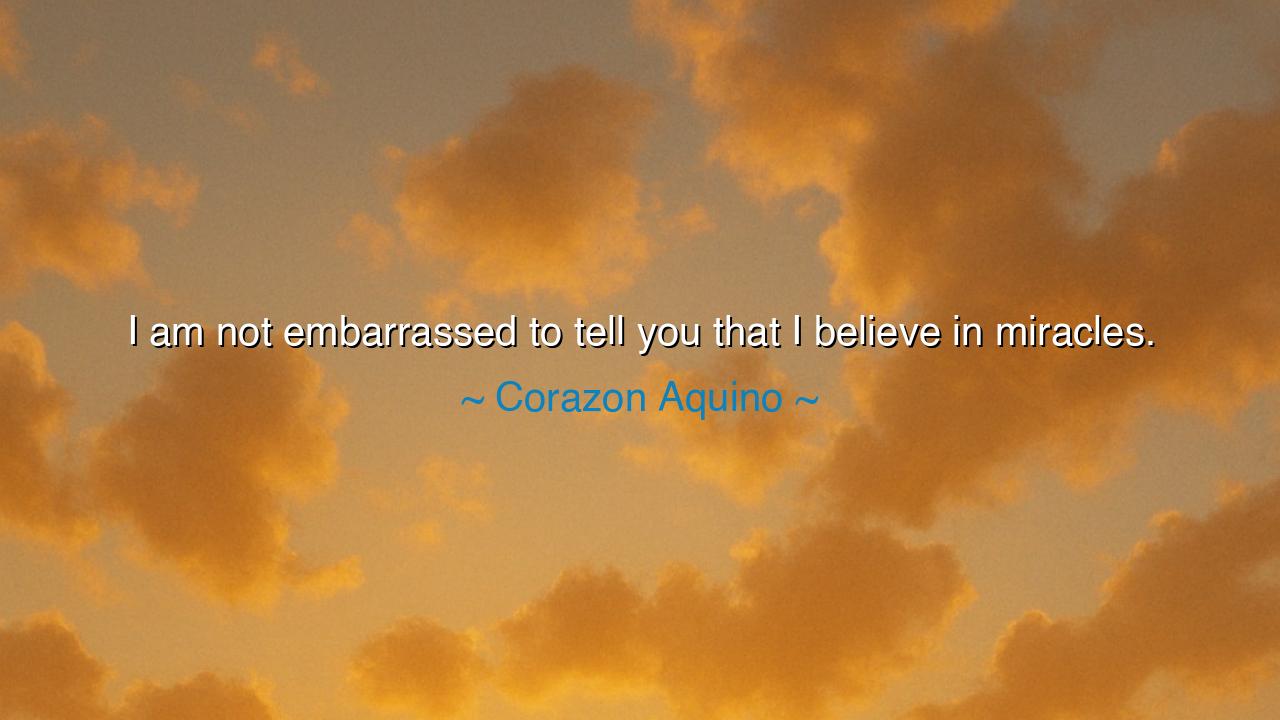
I am not embarrassed to tell you that I believe in miracles.






Hear, O children of hope, the words of Corazon Aquino, who rose from grief to glory and spoke with unshaken voice: “I am not embarrassed to tell you that I believe in miracles.” These words are not the fancy of superstition, nor the idle comfort of the weak. They are the battle-cry of one who endured oppression, the testimony of one who witnessed the impossible made real. To believe in miracles is not to close one’s eyes to hardship, but to open one’s heart to the unseen power of faith, courage, and providence that can turn despair into triumph.
The origin of this saying comes from the tumult of the Philippines, when a people groaned under the iron hand of tyranny. Corazon Aquino, a widow whose husband was slain for daring to speak truth, had no sword, no army, no throne. Yet she had faith—faith in her people, faith in justice, and faith in God. When she declared her belief in miracles, she spoke from lived experience: for who could have believed that the mighty Ferdinand Marcos, with his power and wealth, would be cast down not by violence, but by a sea of ordinary citizens who filled the streets with prayer, rosaries, and unarmed defiance?
Behold the People Power Revolution of 1986, when millions gathered in Manila, facing tanks with flowers, kneeling in front of soldiers with courage instead of fear. What was this, if not a miracle? The guns did not fire. The bloodbath never came. The people prevailed, and Aquino, once only a grieving widow, became the first woman to lead her nation. Truly, it was a moment where history itself bent under the weight of faith and courage. When she said, “I believe in miracles,” it was not a child’s dream but the memory of a nation’s deliverance.
Yet hear me well: a miracle is not always the sudden shattering of chains or the mighty spectacle of nations transformed. Sometimes it is the quiet endurance of the heart, the rising of the sun after a night of despair, the unexpected kindness that heals a wound unseen. To believe in miracles is to believe that the world is more than cruelty and chance—that there is a deeper current, a divine mystery, that lifts the powerless and humbles the proud.
Think too of Nelson Mandela, who languished in prison for twenty-seven years. By all reason, his hope should have died, his cause forgotten. Yet when he walked free, and when he forgave those who had broken his body, the world beheld another miracle: a man who chose reconciliation over revenge, unity over division. As with Aquino, his faith and endurance summoned forth the impossible. History itself seems to whisper: “Miracles are not rare—they await the steadfast.”
O children of the future, learn this: never be ashamed to hope for the miraculous. The cynic will scoff, the realist will frown, but the dreamer who believes becomes a beacon to others. To confess, “I believe in miracles,” is to admit that you see beyond the darkness, that you expect goodness even when none is promised, that you trust the seeds you plant may bloom though the ground seems barren.
Therefore, let your life be guided by this wisdom. When you are pressed down, hold fast to faith. When the world seems immovable, dare to hope. Speak words of encouragement to those who falter, reminding them that the impossible may yet come to pass. Pray, if you are faithful; act, if you are strong; wait, if you must—but always believe. For miracles are not born only of heaven—they rise from human hearts ablaze with courage and love.
So remember Aquino’s words: “I am not embarrassed to tell you that I believe in miracles.” Let this also be your voice. Be unashamed of hope. Stand firm in faith. And live so that your very existence becomes a miracle to others—proof that light can conquer shadow, that truth can overthrow lies, and that love can triumph over death.
––






TBTag Bii
I’m intrigued by the personal vulnerability in this statement. What motivates someone in a position of power to openly share belief in miracles despite potential criticism? Could expressing such beliefs foster empathy and connection with others, or might it create expectations that every challenge will have a miraculous resolution? I’d like to hear perspectives on the impact of openly embracing faith in leadership.
DHDung Hoang
This raises philosophical questions about the nature of miracles. Are they purely supernatural, or could they also represent extraordinary human effort and unexpected positive outcomes? I’m interested in understanding how Aquino’s belief might have shaped her approach to challenges, encouraging people to pursue possibilities that might seem improbable or impossible.
NTNhat Nam Nguyen Truong
I find this perspective inspiring but also wonder how it is perceived by skeptics. Does openly believing in miracles affect credibility or authority, or can it actually strengthen trust among those who value faith and optimism? I’d like to explore examples of leaders whose spiritual or hopeful beliefs positively shaped public morale and outcomes.
MHNguyen Thi Mai Huong
This statement makes me reflect on the role of faith and hope in leadership. How does a belief in miracles influence decision-making in high-stakes situations? Could such a perspective provide resilience and optimism, or might it risk underestimating practical challenges? I’m curious about the balance between hope-driven inspiration and grounded pragmatism in guiding a nation or community.